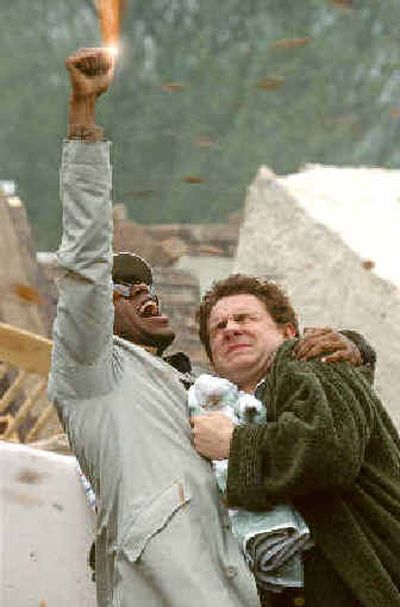On the big screen

“Hitchhiker’s Guide to the Galaxy” has traveled light years in its voyage from airwaves to page to screen.
A film version of Douglas Adams’ cerebrally comic science fiction saga has been a stop-start project for years, sparking anticipation and worry among millions of devoted fans. Adams was working on an oft-rewritten screenplay when he died of a heart attack in May 2001 at 49.
Now, at last, there’s a film.
So are the fans happy? Not entirely.
“It’s faithful, irreverent, fun, funny and in no way the disrespectful waste of celluloid Adams fans had secretly been dreading,” said Scott Andrews on the FilmFocus Web site.
But Adams’ unofficial biographer, M.J. Simpson, called the movie “an abomination” in a scathing 10,000-word review that was quickly beamed around the Internet world of “Hitchhiker” fans.
“You’re aware of the expectations,” says Martin Freeman, who stars as everyman hero Arthur Dent. “Unfortunately, Douglas is no longer with us, so any differences between the film and the books are going to be seen as tap-dancing on his grave.
“What people won’t realize yet is that a lot of the changes are Douglas’ changes,” adds Freeman, best known as likable wage slave Tim in the British sitcom “The Office.”
“Douglas didn’t see the film as this stone tablet that could never change. He saw it as an evolving, ever-changing thing.”
A satirical sci-fi adventure that opens with the Earth being destroyed to make way for an intergalactic highway, the “Hitchhiker’s Guide” began life as a BBC radio series in 1978. Adams turned it into a book, which sold 14 million copies around the world, and later into a TV series (and a computer game).
The book was followed by several sequels, including “The Restaurant at the End of the Universe” and “So Long, and Thanks For All the Fish.”
The series blended satire, memorably named characters such as Zaphod Beeblebrox and Marvin the Paranoid Android and playfully witty philosophy – at one point supplying the answer to “the ultimate question of life, the universe and everything.” The answer: 42.
“Douglas Adams’ humor, not unlike Monty Python, is sophisticated in that it’s unsophisticated,” says Sam Rockwell, who plays the boisterous, two-headed Beeblebrox.
“It deals with a lot of profound themes – religion, world politics, social bureaucracy, the meaning of life – but it has silly jokes in it, too.”
There is much in the movie to please Adams fans: the eponymous Guide, a sort of intergalactic Lonely Planet bearing the motto “Don’t Panic”; the bureaucratic Vogons and their appalling poetry; and a startled, improbable whale.
The cast includes Zooey Deschanel as Arthur’s love interest; Mos Def as his alien friend, Ford Prefect; Billy Nighy as droll planetary designer Slartibartfast; and Alan Rickman as the voice of depressive robot Marvin. John Malkovich appears as Humma Kavula, a nasally fixated cult leader created by Adams for the film.
Adams struggled to transform his episodic scripts into a screenplay, complaining that their picaresque style resisted adaptation.
After the author’s death, screenwriter Karey Kirkpatrick was called in to tighten up the script’s structure, bolstering the romance and streamlining the plot.
“What we didn’t want it to be was one weird thing after another, because after half an hour of that you really do tire very quickly,” says Garth Jennings, the film’s director, who has made music videos for bands including Blur and R.E.M.
He says the filmmakers’ priority was “just trying to keep it funny, because it is a comedy first and foremost. We didn’t want to just make a film that was trying to compete with the effects of other big, effects-driven movies.”
The filmmakers are clearly protective of Adams’ memory. The film is dedicated to him, and his image appears on screen several times. There is even a 30-foot model of his nose.
Jennings likes to think of the atheist Adams watching the film’s progress from on high – perhaps at the Restaurant at the End of the Universe.
“It’s a lovely image,” Jennings says. “Having a drink at the bar, watching the universe explode before his eyes.”